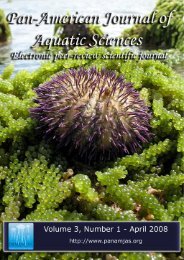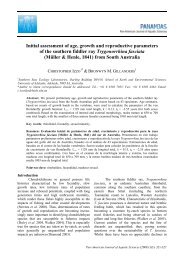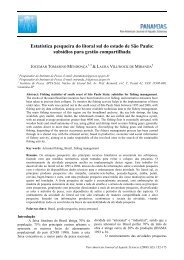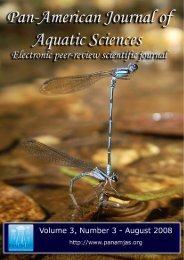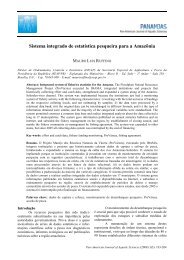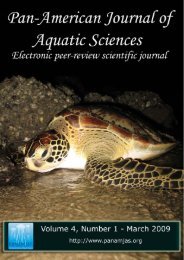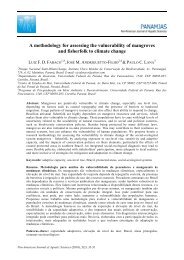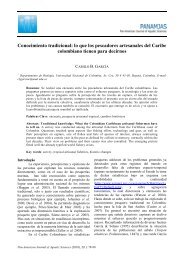Download full issue - PanamJAS
Download full issue - PanamJAS
Download full issue - PanamJAS
- No tags were found...
Create successful ePaper yourself
Turn your PDF publications into a flip-book with our unique Google optimized e-Paper software.
RIO GRANDE DECLARATION1 st BRAZILIAN WORKSHOP ON CLIMATE CHANGES IN COASTALZONES: CURRENT KNOWLEDGE AND RECOMMENDATIONSUNIVERSIDADE FEDERAL DE RIO GRANDE (FURG)Rio Grande, RS, Brazil13 – 16 September 2009The impacts of Global Climate Change on the environment and society represent the biggestchallenge for human civilization in the twenty-first century. Scientists around the world are workingintensely to understand the climatic processes involved and the possible consequences of climate changeat global, regional and local levels. Governments of different countries have initiated studies ofvulnerability to climate change and adopted mitigation and adaptation measures to face this new reality.The establishment of the Brazilian Research Network on Global Climate Change (Rede CLIMA)and the implementation of the National Institute of Science and Technology (INCT) for Climate Change,were important initiatives to adequately address these <strong>issue</strong>s in Brazil; since these organizations involvescientists of different disciplines. One of the main objectives of Rede CLIMA is to significantly increasethe knowledge on the impact of climate change and to identify key vulnerabilities in different Braziliansectors and systems. Coastal Zones stand out as an important system due to its environmental and societalsignificance.Large cities and populations are concentrated near rivers and in low altitude regions (fertilevalleys) within 100 km of the coastline, and population density of the coastal zone is likely to more thandouble by 2050. Impacts of climate change and urban development will triple the number of peopleexposed to coastal flooding by 2070. Goods and services from coastal ecosystems valued by societyrepresent about 33 trillion dollars globally. Coastal zones are therefore, among the most vulnerable areasto global climate change impacts, since they will be directly affected by the increase in the average sealevel, exposure to extreme storms, changes in discharge regimes of rivers, elevation of sea surfacetemperature, ocean acidification and other events. However, potential impacts of climate change, bothphysical and biological, will vary considerably among coastal regions, according to their naturalcharacteristics and the degree of environmental degradation. Therefore, understanding the impacts ofglobal climate change in every region is essential for strategic planning and decision-making by thegovernment and the Brazilian society.During the "First Brazilian Workshop on Climate Changes in Coastal Zones" in Rio Grande (RS),scientists from around the country assessed the current state of knowledge on impacts of climate changeon Brazilian coastal zones and discussed procedures to standardize protocols and strategies for networkingobservational studies. About 200 university professors, graduate and post-graduate students attended theevent. Among these, thirty-five were invited speakers from Rede CLIMA and the National Institute ofScience and Technology (INCT) for Climate Change. Thirty-eight research papers (among oral andpanels) were presented, representing 121 authors from different Brazilian institutions and regions. BasedPan-American Journal of Aquatic Sciences (2010), 5(2): XII-XV



